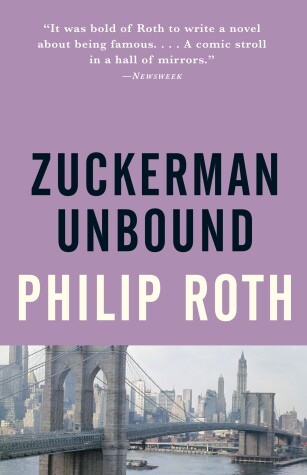Nathan Zuckerman
2 primary works • 3 total works
Book 1
The Ghost Writer introduces Nathan Zuckerman in the 1950s, a budding writer infatuated with the Great Books, discovering the contradictory claims of literature and experience while an overnight guest in the secluded New England farmhouse of his idol, E. I. Lonoff.
At Lonoff's, Zuckerman meets Amy Bellette, a haunting young woman of indeterminate foreign background who turns out to be a former student of Lonoff's and who may also have been his mistress. Zuckerman, with his active, youthful imagination, wonders if she could be the paradigmatic victim of Nazi persecution. If she were, it might change his life.
The first volume of the trilogy and epilogue Zuckerman Bound, The Ghost Writer is about the tensions between literature and life, artistic truthfulness and conventional decency—and about those implacable practitioners who live with the consequences of sacrificing one for the other.
At Lonoff's, Zuckerman meets Amy Bellette, a haunting young woman of indeterminate foreign background who turns out to be a former student of Lonoff's and who may also have been his mistress. Zuckerman, with his active, youthful imagination, wonders if she could be the paradigmatic victim of Nazi persecution. If she were, it might change his life.
The first volume of the trilogy and epilogue Zuckerman Bound, The Ghost Writer is about the tensions between literature and life, artistic truthfulness and conventional decency—and about those implacable practitioners who live with the consequences of sacrificing one for the other.
Book 2
A “masterful” novel (The New York Times Book Review) from the Pulitzer Prize–winning author of American Pastoral tells the story of a bestselling writer whose life is falling apart—all because of his great good fortune.
Now in his mid-thirties, Nathan Zuckerman, a would-be recluse despite his newfound fame as a bestselling author, ventures onto the streets of Manhattan in the final year of the turbulent sixties. Not only is he assumed by his fans to be his own fictional satyr, Gilbert Carnovsky ("Hey, you do all that stuff in that book?"), but he also finds himself the target of admonishers, advisers, and sidewalk literary critics. The recent murders of Robert Kennedy and Martin Luther King, Jr., lead an unsettled Zuckerman to wonder if "target" may be more than a figure of speech.
In Zuckerman Unbound, the notorious novelist Nathan Zuckerman retreats from his oldest friends, breaks his marriage to a virtuous woman, and damages, perhaps irreparably, his affectionate connection to his younger brother.
Now in his mid-thirties, Nathan Zuckerman, a would-be recluse despite his newfound fame as a bestselling author, ventures onto the streets of Manhattan in the final year of the turbulent sixties. Not only is he assumed by his fans to be his own fictional satyr, Gilbert Carnovsky ("Hey, you do all that stuff in that book?"), but he also finds himself the target of admonishers, advisers, and sidewalk literary critics. The recent murders of Robert Kennedy and Martin Luther King, Jr., lead an unsettled Zuckerman to wonder if "target" may be more than a figure of speech.
In Zuckerman Unbound, the notorious novelist Nathan Zuckerman retreats from his oldest friends, breaks his marriage to a virtuous woman, and damages, perhaps irreparably, his affectionate connection to his younger brother.
The Counterlife is about people enacting their dreams of renewal and escape, some of them going so far as to risk their lives to alter seemingly irreversible destinies. Wherever they may find themselves, the characters of The Counterlife are tempted unceasingly by the prospect of an alternative existence that can reverse their fate.
Illuminating these lives in transition and guiding us through the book's evocative landscapes, familiar and foreign, is the miind of the novelist Nathan Zuckerman. His is the skeptical, enveloping intelligence that calculates the price that's paid in the struggle to change personal fortune and reshape history, whether in a dentist's office in suburban New Jersey, or in a tradition-bound English Village in Gloucestershire, or in a church in London's West End, or in a tiny desert settlement in Israel's occupied West Bank.
Illuminating these lives in transition and guiding us through the book's evocative landscapes, familiar and foreign, is the miind of the novelist Nathan Zuckerman. His is the skeptical, enveloping intelligence that calculates the price that's paid in the struggle to change personal fortune and reshape history, whether in a dentist's office in suburban New Jersey, or in a tradition-bound English Village in Gloucestershire, or in a church in London's West End, or in a tiny desert settlement in Israel's occupied West Bank.

